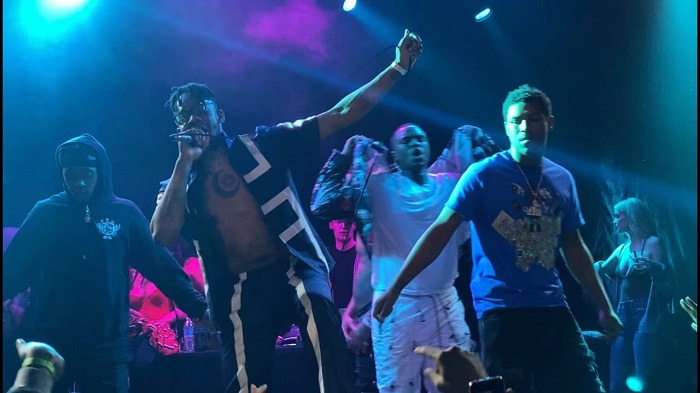Rap is a musical style where improvisation and spontaneity combine with the talent to produce songs that are as catchy as they are great. However, despite the seemingly simple structure of many songs, correctly spinning urban phrases and melodies requires a lot of talent and dedication.
In this article, we show you how to learn to rap. From the rhyme to the message you want to convey, there are many things to consider before you start rapping. Discover your improvisation skills and start practicing now.
How to learn to rap?
To know how to get rap rhymes, you must first sharpen your musical ear. Listen to songs from various well-known rappers, in different languages and with different styles. Do not focus so much on the lyrics of the songs, but on the rhythm that accompanies them and, above all, on the effect produced by the rhyme when synchronized with the music.
Try to listen to various musical references, from references such as Snoop Dog or Missy Elliot to current artists such as Drake or Nicki Minaj, for example. Listen to everything until you find your favorite style and, thus, you will have references that help you define your own.
Rap is a genre that is constantly changing. Tracks and rhythms can define the era of a song, so make sure you not only listen to your favorite rappers but study the history and cultural context of their songs, as well as the different music production techniques used in them.

Optimize your diction and pronunciation
To rap, you will need to articulate words and phrases at a higher speed than the standard one. To do this, you must make sure that your letters are simple and understandable to the public since it will not help to rhyme a lot of sentences if the words are practically unintelligible or of little use.
You may also like to read, jaclyn hill net worth. To know more visit our blog http://www.webmagazinetoday.com/.
Pronounce each word well, with emphasis on pronouncing each consonant. If you can rap at a different tone and speed than your way of speaking, you will surely be able to acquire the necessary flow to synchronize your voice with the song’s melody.
Similarly, you must establish a rhythm and modulation that allow you to maintain the rhythm and intonation. If you speak too fast you will easily run out of air, so properly articulate each word so you don’t stumble or stammer while rapping. Some tips to improve diction are:
- Repeat the words slowly and slowly.
- As you pronounce the words, open your mouth more than usual and focus on each syllable of the word.
- Put a pencil or pen in your mouth. Hold it with your teeth and try to pronounce the words like this. You will force your tongue and your mouth to move more than usual to pronounce the words.
- Record yourself while you rap and pinpoint words or letters that you still don’t pronounce quite right. Practice them.
Expand your vocabulary
By listening to many songs by various successful rappers you can expand your vocabulary. In the same way, it is vital that you know very well the colloquial language of the audience you want to target. Whether you rap in English or Spanish, you must master a comprehensive glossary of terms that allows you to easily connect with the public.
It is not about using fancy words or exceeding in the use of expletives and rudeness, but about using ingenuity to express yourself naturally and effusively. Also, if you have trouble thinking of good rhymes, it may be because you lack words to communicate your ideas.
Don’t let rap be your only reference. As with all forms of art, rap thrives on other cultural references. Read more books, watch more movies, discover more music genres – only then will you discover the inspiration and vocabulary you need to express new ideas about the world around you.
Learn songs from other artists
As we mentioned before, the more musical references you have, the more rap you can acquire. Although rap requires talent to write verses and rhymes that fit perfectly into an urban rhythm, you can start by learning songs from established artists and, thus, you will have a basis to take your first steps singing.
Repeat again and again the lyrics of your favorite songs, sing them at home and with your friends and, when you master the lyrics and know the rhythm well, dare to give it your personal touch. Change the tone and rhythm of some phrases or even try modifying some verses yourself to start writing your own songs.
Improvise with rhythm
Pay attention to how singers base their songs on two fundamental aspects: finding a rhyme in each phrase and giving it a backing track with a constant rhythm.
To discover how to learn to improvise, you will need to develop the ability to capture the rhythm of a melody and express your ideas with it. This is why references are so important: if you have different tracks and rhythms to start within your mind, you can apply it to your first songs and start working from them. Think about what you want to say and find the keywords to be as eloquent and impactful as you can.
Structure your own rhymes
The completion of each word is key to learning to rhyme. Each phrase should end with practically the same sound to spin the rhythm of each verse. This will make your song much more catchy and easier to memorize.
Start by structuring short sentences, at a slow-moderate pace. As you practice more and more you will be able to create complex letters and metrics, where your own style will be reduced not only by the intonation but also by the phrases and words used. This way you will gain authenticity and musical mastery.
Define your flow
Similarly, to know how to learn to improvise you must define your flow. You should let your ideas flow naturally, without forcing the words you use or the topics you touch. From defining your name or an artistic pseudonym to delimiting the topics you want to deal with (social complaints, personal experiences, love, hate, crime …), your flow will determine how to rap with your heart.
Similarly, flow is key to finding the speed at which you can rap, as well as your ideal tone of voice. Practice constantly until your words come out naturally and you can build the lyrics of your songs.
Start with freestyle
Freestyle is ideal if you want to start doing rap for beginners. Rape out loud and express yourself freely in front of your friends to gain confidence. Each rhyme you can think of, write it down in a notebook or record it with your mobile and, in this way, you will define your own style.
When you already have your own repertoire and enough confidence, try facing some street battle. In this way, you will make yourself known and test your skills. Of course, prepare well because the freestyle battles in rap and hip hop are characterized by their harshness.
Practicing and facing freestyle battles is the best way to hone your improvisation skills and improve your rhythm.
You may also like to read, junjou romantica season 4. To know more visit our blog http://spreadshub.com/.
Express yourself sincerely
To learn rap and create your own rhymes, always keep one thing in mind: be honest. Express yourself with the utmost sincerity and eloquence and you will see how you will quickly gain followers.
Although having musical references is good, do not try to imitate or copy anyone. On the contrary, it tries to define an authentic style and bring something really quality to rap music.
Rape with your friends
When you start doing rap rhymes at home, constantly share your songs with your friends. Get together with them and you will see how, joking and listening to music together, it will be easier to learn to improvise and rhyme. Similarly, take advantage of social networks to share your work. So you can make yourself known quickly and on a large scale. In addition, you can be nourished by public comments to know what aspects you need to improve.
Lastly, to define your rap base, memorize your own rhymes to create song lyrics. If you can memorize a song from your favorite rapper, make the effort to produce your own music and that this is now the protagonist of your daily playlist.
Memorizing your own rhymes is the first step to define your flow, and then start writing songs. Be patient, inspiration comes along, and when you pick up your own rhythm, you’ll see how rap flows nonstop in your head.
You may like also to read http://theothersidemagazine.com/
